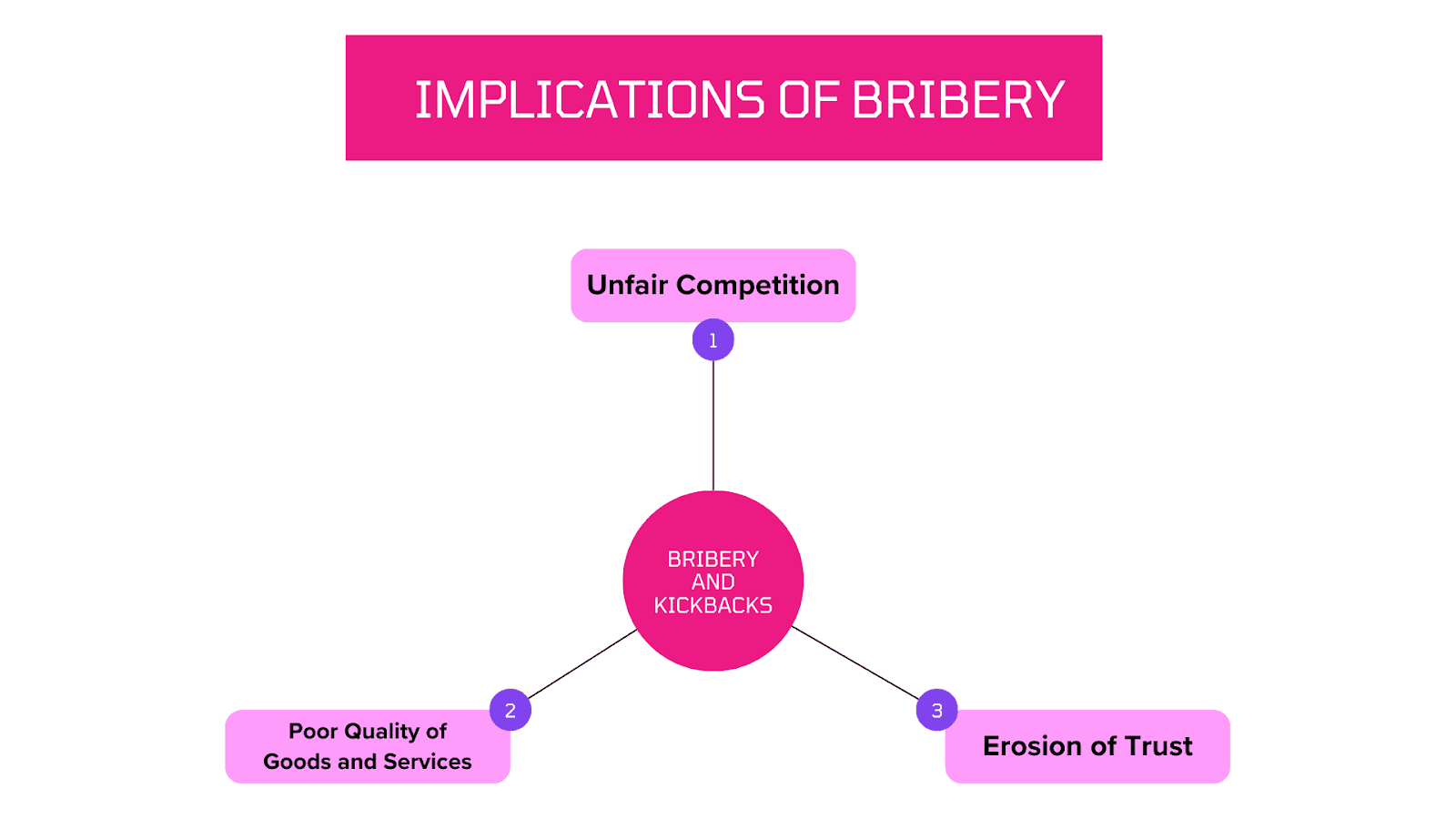
Bribes and kickbacks: definition, common forms, and prevention
Source:Pexels
Ethical conduct is essential. It highlights honesty, fairness, and equity in our interpersonal, professional, and academic relationships. However, bribery and kickbacks constantly threaten ethical behavior in business since they destroy fair competition and public trust. This article focuses on identifying such corrupt practices which are common today. The article defines and analyzes bribes and kickbacks, common forms of bribery, their effects on businesses, and ways to prevent them.
What are bribery and kickbacks?
Both bribery and kickbacks are illegal and unethical acts. They usually involve improper exchange of money, favor, or other valuable means to influence a decision-maker.
Black’s Law Dictionary defines bribery as offering, giving, receiving, or soliciting any valuable item to influence an official and its actions, particularly in the briber’s favor.
Similarly, kickback is a type of bribery. It involves a commission, referral, or consulting fee collusion between agents of the two parties. Kickbacks are usually offered to encourage the other party to cooperate in the scheme.
Common forms
Bribery takes many forms. It involves clever and subtle disguises to ensure the privacy and secrecy of these illicit acts.
Here are some common, subtle, and clever forms of bribery in business:
Cash:
Cash is the most common and direct form of bribery today. In essence, it involves exchanging money to influence an official’s actions or decisions. For example, a constructor pays fifty thousand dollars to a public official to secure a highway contract. In this example, the constructor is the briber, the public official is the bribe-taker, and the payment is the bribe.
Bribery through cash is also a high-risk act. It allows for the trace of individuals and parties involved in bribery, providing evidence of their transactions. For example, a government official who receives an envelope full of cash at his office can easily be reported to the authorities concerned. Authorities like NAB are responsible for investigating such activities to prevent bribery and corruption.
Gifts:
Gifts are the second most common form of bribery. These gifts are usually tokens or items intended to curry favor with the bribe-taker.
One example of gifts as a form of bribery is an employee offering his boss a fancy car from his father’s car lot in exchange for favors.
Charitable donations:
In this form, a bribe is made by transferring funds to a charity. The decision-maker, or the one who is taking the bribe, is often affiliated with this charity.
For instance, a construction company donates to a university foundation, in which a government official has shares.
Thus, the donation is a bribe to influence that government official. This way, the official will unethically benefit the company.
Job offers:
Bribes can also take the form of job opportunities. In general, fake jobs might be created to benefit the decision-maker, or his associates, to gain favors in return.
Implications of bribery
Like a termite infestation slowly eating away the foundations, bribery affects almost every aspect of business.
Here are some key implications of bribery and kickbacks:
Bribery creates unfair competition
A company may bribe government officials to secure contracts. Such companies have an unfair advantage over others that follow ethical practices. Thus, bribery creates an uneven business field where quality and merit are meaningless.
Bribery leads to poor quality of goods and services
A notable example is the 2013 European horse meat scandal. In this scandal, bribery led to the inclusion of horse meat in meat products instead of the advertised beef. This way, bribery led to poor food quality and safety standards.
Bribery severely damages trust
UN Secretary-General António Guterres has pointed out the negative effects of bribery on trust. He once used the expression “utmost betrayal of public trust” to describe the implications of bribery and corruption.

Source: Author Generated
The case of Siemens
The consequences of bribery are severe. If caught, companies can face repercussions for their actions like fines and criminal charges.
In 2007, Siemens was caught paying billions of dollars to officials worldwide. The company admitted to bribing these government officials to secure contracts. According to SEC, “Siemens made thousands of payments… to bribe government officials in return for business contracts given to Siemens around the world.”
This case highlights the possible consequences for those involved in bribery.
How companies can prevent bribes and kickbacks
Combating bribes and kickbacks is a real challenge. However, through effective policies, a code of conduct, and regular training, companies can develop strategies to counter bribery. Presented below are some key strategies in this regard.
Develop a clear ABAC policy
Anti-Bribery and Anti-Corruption (ABAC) policies should be clear, specifically defining prohibited conduct. These policies should also outline procedures for suspected bribery and disciplinary actions against violations.
A simple and effective ABAC policy will have:
- Zero-tolerance statement
- Risk assessment protocols
- Guidelines on gifts and hospitality
For instance, The US FCPA “prohibits the offer or agreement to give ‘anything of value’ to an Official for a corrupt purpose.”
Implement a code of conduct
A company code of conduct is a set of rules that protects the business and informs the employees of the company’s expectations.
A code of conduct covers:
- The standard for behavior
- Compliance with laws and regulations
- Expectations for transparency and honesty
Conduct regular training:
Ongoing regular training programs are a must for a business to ensure that employees understand the risks associated with illegal acts.
In general, a training should:
- Be provided to all employees periodically
- Include real-world scenarios and case studies
- Offer guidance on reporting suspicious activities
Case studies like the Ericsson bribery are an excellent example to include in a company training program. It can highlight the consequences of non-compliance and the importance of vigilance in business.
Global efforts against bribery
The fight against bribery and kickbacks never ends. It extends even beyond national borders with acts like the US Foreign Corrupt Practices Act (FCPA) of 1977 and the UK Bribery Act of 2010.
Both acts prohibit companies from bribing local and foreign government officials. These regulations show a global effort against bribery and kickbacks.
Conclusion
Bribery and kickbacks are preventable aspects of business. By understanding the deceptive nature of bribery, its effects, consequences, and preventable measures, companies can easily develop a more ethical business environment. By emphasizing integrity and transparency, a company can promote honesty, trust, and fair competition, contributing to a world free from this poison.
